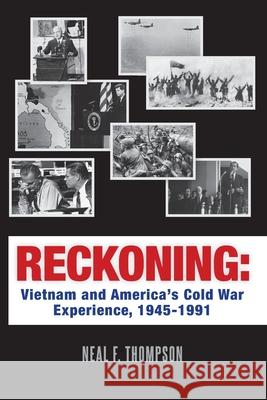Reckoning: Vietnam and America's Cold War Experience, 1945-1991 » książka
Reckoning: Vietnam and America's Cold War Experience, 1945-1991
ISBN-13: 9780615622729 / Angielski / Miękka / 2013 / 576 str.
Cold War orthodoxy provides Americans with every reason to be proud of their "long twilight struggle" against Communism. It begins, of course, with Harry Truman, his heroic resistance to Soviet aggression in Europe, his defense of democracy in Korea and his opposition to the disastrous influence of McCarthyism, a malevolent force injected into "the bloodstream of the society" by the right in 1948. Moving on, orthodoxy teaches us of John Kennedy's doomed if honorable attempts to save an unsustainable ally in Southeast Asia, Lyndon Johnson's disastrous attempt to follow Kennedy's path and the courage and insight of those who saw the folly before them and led America out of this singularly unjust, ill-advised campaign. Orthodoxy ends with the West's final, brilliantly engineered triumph over Soviet Communism, which represents a splendid, bi-partisan accomplishment in which all Americans, left and right can take pride. This is all very nice if only it were true. Reckoning: Vietnam and America's Cold War Experience, 1945-1991, is a compelling exercise in saying things that, in George Orwell's words, it is "just not done to say" and identifying facts that have been hiding in plain sight-"elephants in the living room" as they are commonly known. Starting with the "Communist movement of the 1930s" and all that came with it, Reckoning chronicles the Soviets' massive North American espionage network, Truman's feckless response, his relentless obstruction of Congressional attempts to investigate these matters and his ruthless purge of leftists from the federal civil service, all of which combined to poison political discourse in this country for decades. Reckoning examines Truman's slaughterous, senseless campaign in Korea in all its folly and brutality-a campaign that led the United States directly into Southeast Asia-which, orthodoxy aside, was a war winnable within a reasonable definition of victory but fought ineffectively and lost by politicians like John Kennedy and Lyndon Johnson, whose every move was dictated by an obsessive fear of, in Johnson's words, "another Korea," which, although listed today in America's "win" column, had driven Truman from office with 22% poll ratings. Finally, Reckoning examines the campaign in Southeast Asia in full Cold War context, focusing on history rather than ideology and applying a single, reasonably objective set of standards to judge the conduct of enemies, allies and Americans from 1939 to the fall of the Soviet Union, demonstrating thereby that there is no intellectually honest way to condemn this country's war in Southeast Asia that does not serve to delegitimize the Truman Doctrine in its entirety. In short, if the Cold War, with the Truman Doctrine at its core, represents a just cause successfully concluded, as orthodoxy would have us believe, embracing America's ultimate victory over Communism while condemning the campaign in Southeast Asia is like accepting World War II as this country's finest hour while denouncing MacArthur's defense of and eventual return to the Philippines because the United States, having stepped into Spanish shoes as colonial occupier at the turn of the century, had no rightful presence or interests there. You might be surprised much of what you read here, but a paradigm shift in worldview awaits anyone willing to read Reckoning with an intellectually honest, open mind.











